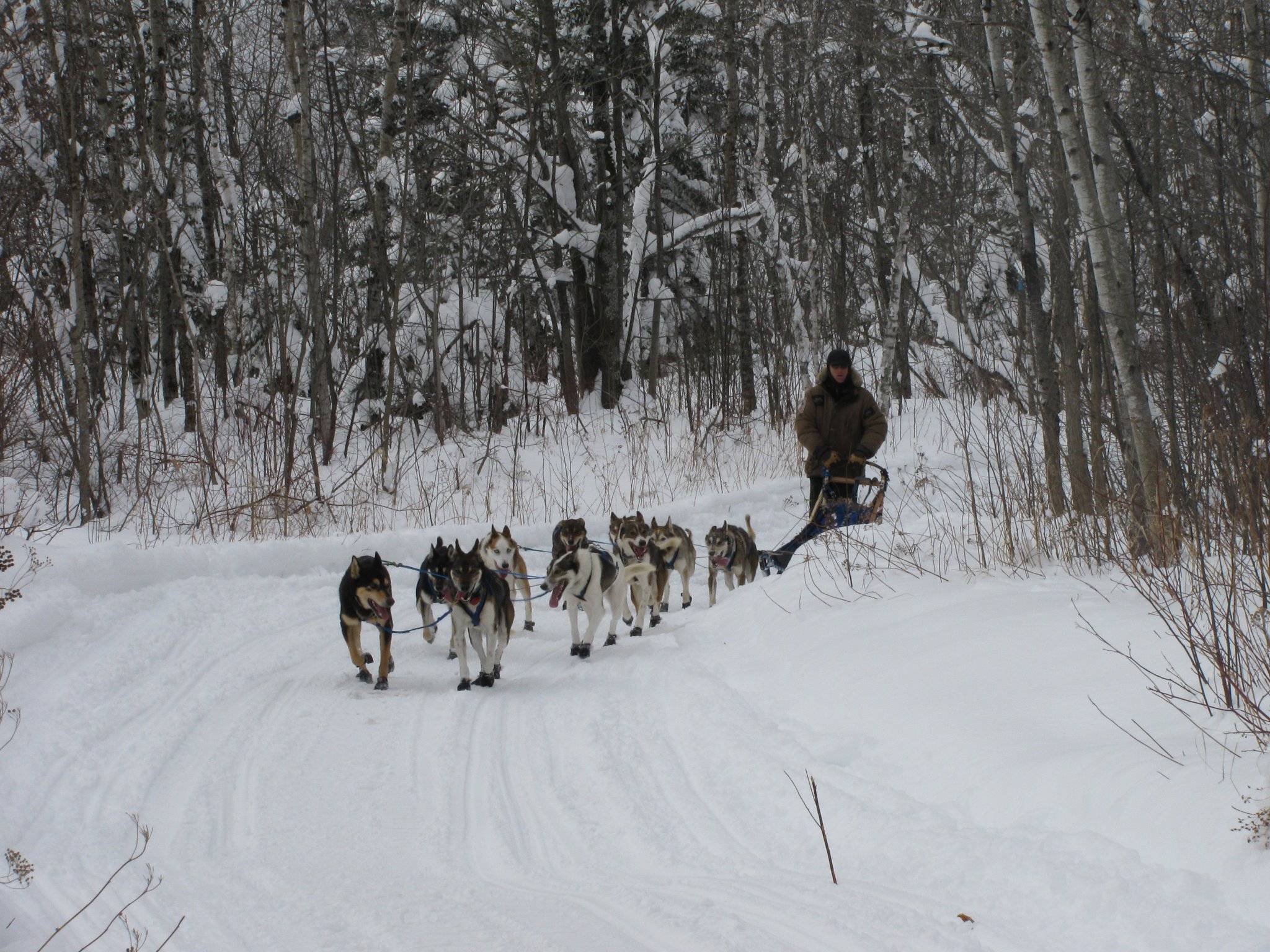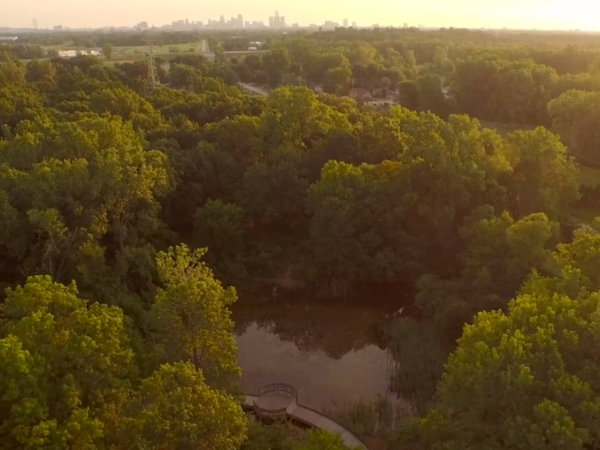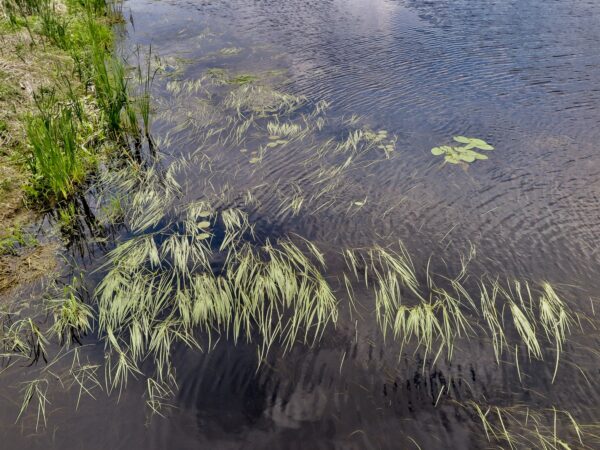
Editor’s Note: “Nibi Chronicles,” a monthly Great Lakes Now feature, is written by Staci Lola Drouillard. A direct descendant of the Grand Portage Band of Ojibwe, she lives and works in Grand Marais on Minnesota’s North Shore of Lake Superior. Her two books “Walking the Old Road: A People’s History of Chippewa City and the Grand Marais Anishinaabe” and “Seven Aunts” were published 2019 and 2022, and she is at work on a children’s story. “Nibi” is a word for water in Ojibwe, and these features explore the intersection of indigenous history and culture in the modern-day Great Lakes region.
The John Beargrease Sled Dog Marathon was held at the end of January—the 39th running of the race. The 300-mile route takes teams along the Highlands of Lake Superior, before cutting inland toward Sawbill Lake and the Gunflint Trail, then on to Grand Portage for the finish. The race is named for Ojibwe mail carrier John Beargrease (Mako bimide), who was responsible for bringing mail to and from the North Shore in the late 1800s in the days before highways. The tradition of moving things via dog sled is deeply entrenched in the culture of the North Shore, and our local mushers are well known in the community, because they also serve as nurses, baristas, conservation officers or change makers—as was the case with my friend Frank Moe.
Frank served as the musher representative on the Beargrease Board for a time. The racecourse used to be longer—over 400 miles—and Frank suggested reducing the number of miles to attract more mushers and he was right. This year 17 teams entered in the marathon and 23 teams were in the mid-distance. The start is always a festive occasion for dogs and humans—so much barking and excited howling as each team approaches the gate. This will be the second year without Frank and his team of twelve dogs at the start. Last winter we lost Frank to brain cancer and the race starts haven’t been quite the same since. He especially liked to check in with each dog before taking off. “There goes Frank kissing his dogs again,” I would tease, and he would laugh, knowing it was true.
When I met Frank 11 years ago, he was wearing his musher regalia—big coat, iceman boots, safety orange hat. I had been called to attend a meeting about organizing against copper nickel mining in the Lake Superior watershed. Antofagasta, an international mining conglomerate was seeking permits to build a copper extraction and processing plant in the water-rich area north of the Fond du Lac Reservation. It was the first of two mining projects proposed within ceded territory—the other was Twin Metals, located in Ely at the edge of the Boundary Waters Canoe Area Wilderness, a federally designated wilderness area. Frank announced to the small group that, “I’m going to mush my team of dogs to the Capitol to protest sulfide mining.”
This was good news to me—I had been following the Polymet proposal and felt like I was the only person asking questions about the potential risks. And so, I was fully on board the proverbial sled, even though I didn’t really know Frank, and to be quite honest, thought he was nuts. But that was the thing—as a former state legislator, Frank saw an opportunity to lead and he took it, knowing that others would jump in to help and we did.
The plan was to host a send-off rally in Grand Marais, and make stops along the way to raise awareness about the issue. The day Frank left, the streets were a slushy mess. It was early March, but lack of snow and mild temperatures made it feel more like April. The Stonebridge singers—a drum group from Grand Portage–played a traveling song and people were in good spirits. A friend pointed up at the sky and said, “look, there’s an eagle.” I snapped a photo of it with my old-fashioned digital camera to prove that indeed, migizi was there.
At the Lester Park rally in Duluth, Frank and his team swept into the snowy arena as a drum group from Fond du lac opened the rally. And there again—a pair of eagles flying high above the canopy of trees. As the team of helpers grew along the way, the tone of the trek changed from nervous anticipation to that of a hero’s journey. Here was a man on a dog sled, navigating snowmobile trails in the north, then paved trails and roads in central Minnesota, all leading up to the tangled city streets of St. Paul. As Frank got closer to the Twin Cities the momentum grew and it felt as if our collective voice had wings—or paws, as the case may be.
The day Frank was set to arrive in St. Paul, I was in the Twin Cities monitoring media stories and the organizer email chain. There had been no snow in the days prior—the streets were bare, but early that morning a light dusting covered the ground. For those of us who had put our faith in Frank’s safe arrival and witnessed eagles at every checkpoint, we knew that the snow was not a coincidence, it was a gift. The crowd grew, and all of a sudden there he was, running his team across the sidewalk and onto the steps of the Capitol. The simple message that Frank delivered that day is this: The legacy of clean water in Minnesota is much more important than corporate mining interests.
Frank had always been an advocate for clean water—his work in the state legislature brought us the Legacy Amendment—a bipartisan piece of legislation that passed in 2008 with 56% of the vote. This is just one of Frank’s legislative accomplishments that continues to set Minnesota apart from other states, and we honor him for it.
An outspoken advocate for tribal treaty rights and the protected status of manoomin (wild rice), he used his position as legislator to promote the integrity of this native plant, taking on the biotech industry and the University of Minnesota, who were pushing to genetically modify it as a cash crop. Despite the powerful opposition, the bill Frank wrote was signed into law in early May 2007.
When it was decided to make a film about Frank’s trip to St. Paul I served as president of Sled Dogs to St. Paul. Working closely with him on that project gave me insight into Frank’s gift of humanity—which was so apparent when it came to his dogs. As a larger-than-life figure in some ways, I witnessed him come right back down to earth because of them. He loved to tell the story of how his first lead dog Acorn once stopped him and the team from going through the ice, while on a training run in Bemidji. He said, “Acorn just stopped running, and I knew then that she saved our lives that day. That’s when she taught me how to be a musher.”
Beaver Bay is a place of significance along the race trail because it is the former home of John Beargrease, and it is also where he is buried. In 1910, he worked to rescue a fellow mail carrier who was caught in the waves off Tamarack Point, near Grand Portage. He did save his friend, but sadly contracted pneumonia and didn’t recover. Frank told me that every time he led his team through Beaver Bay, he would put a little bit of asemaa (tobacco) down along the trail, to honor the spirit of John and his dog team. Before Frank left this world, he was given the name Zoongide’ inini, which in English means, “He Stands Strong.” It is a very rare occasion when a non-Indigenous person is given an Ojibwe name and Frank lived up to his name.
The week before the start of the 2023 Beargrease Marathon, while mushers were getting ready to pack up their dogs and head out in sub-zero temperatures, the news was announced that the Secretary of the Interior Deb Haaland, and the Biden Administration had placed a 20-year moratorium on extractive mining practices in the Rainy River watershed—one of the sites associated with the proposed Twin Metals mining operation. The Department of the Interior has the authority to enforce this for a maximum of 20 years and only Congress can legislate a permanent withdrawal. It’s a ban that can be reversed at the pleasure of the President—language often used in treaties and other official documents related to Indigenous lands and people.
On race day, as the announcer welcomed Bib #1—John Beargrease to the starting gate, a symbolic gesture to honor the many miles and good work of Mako bimide, I went outside and put some asemaa on the clean ground, wishing all of the mushers and their teams safe passage. Because these men and women are not just carrying on the great tradition of mushing—in some cases, they carry with them our collective voice and hopes for the future, like my friend Frank did. Whether on the wings of eagles or the paws of sled dogs.
Catch more news at Great Lakes Now:
Nibi Chronicles: “The trees of our homeland”
Nibi Chronicles: Beach at Nishkwakwansing returned to tribal trust
Featured image: Frank and team arrive at Lester Park in Duluth. (Photo courtesy of Stephan Hoglund)




